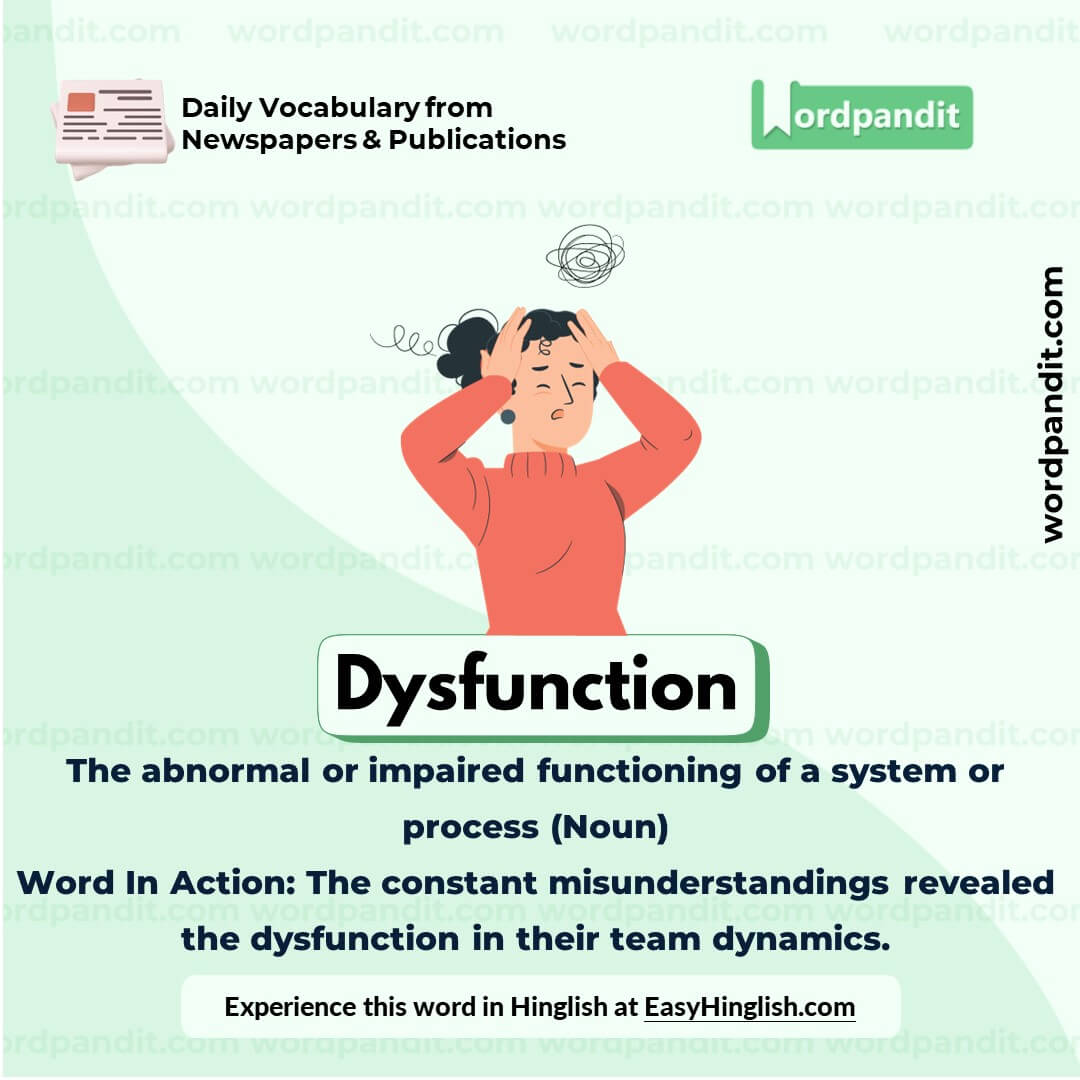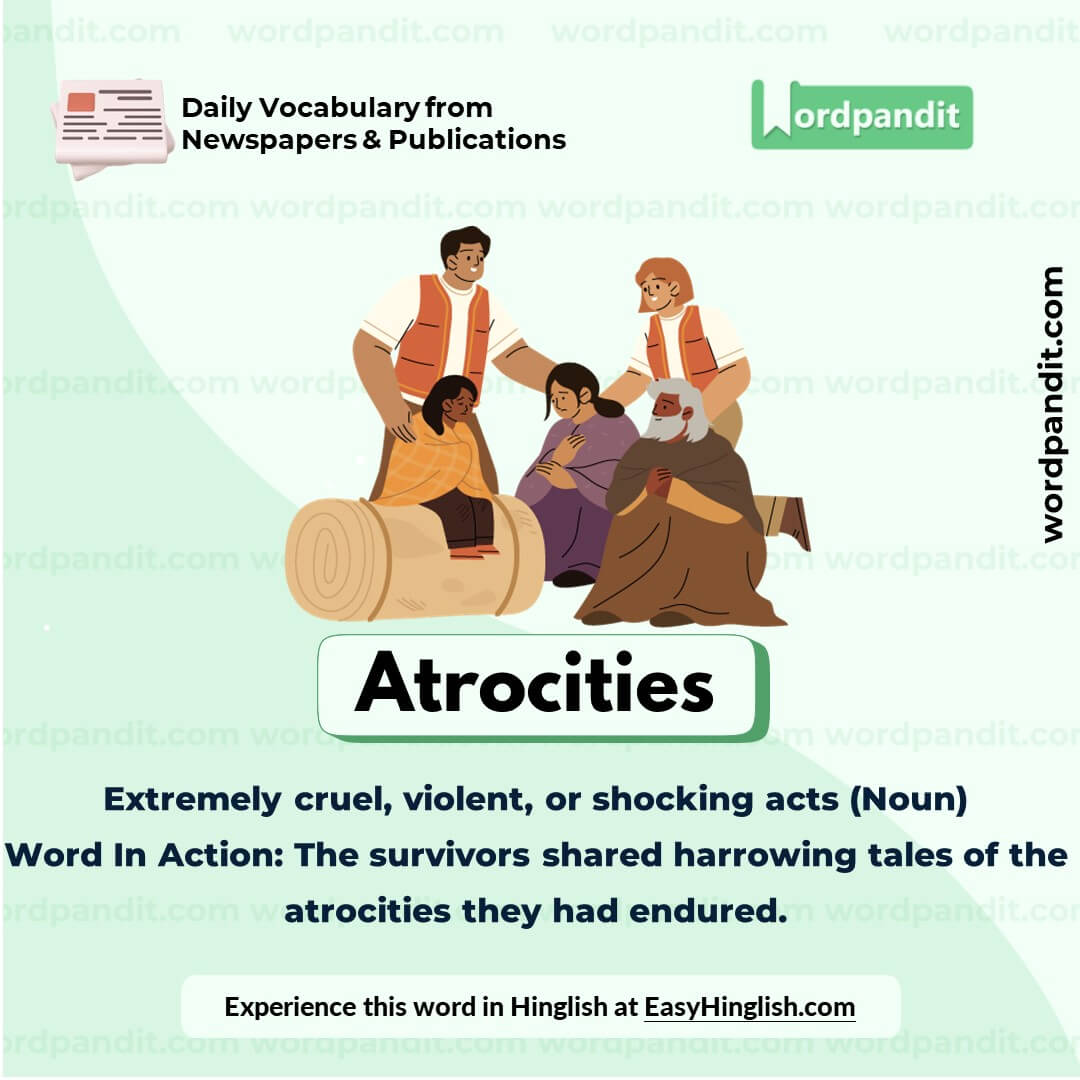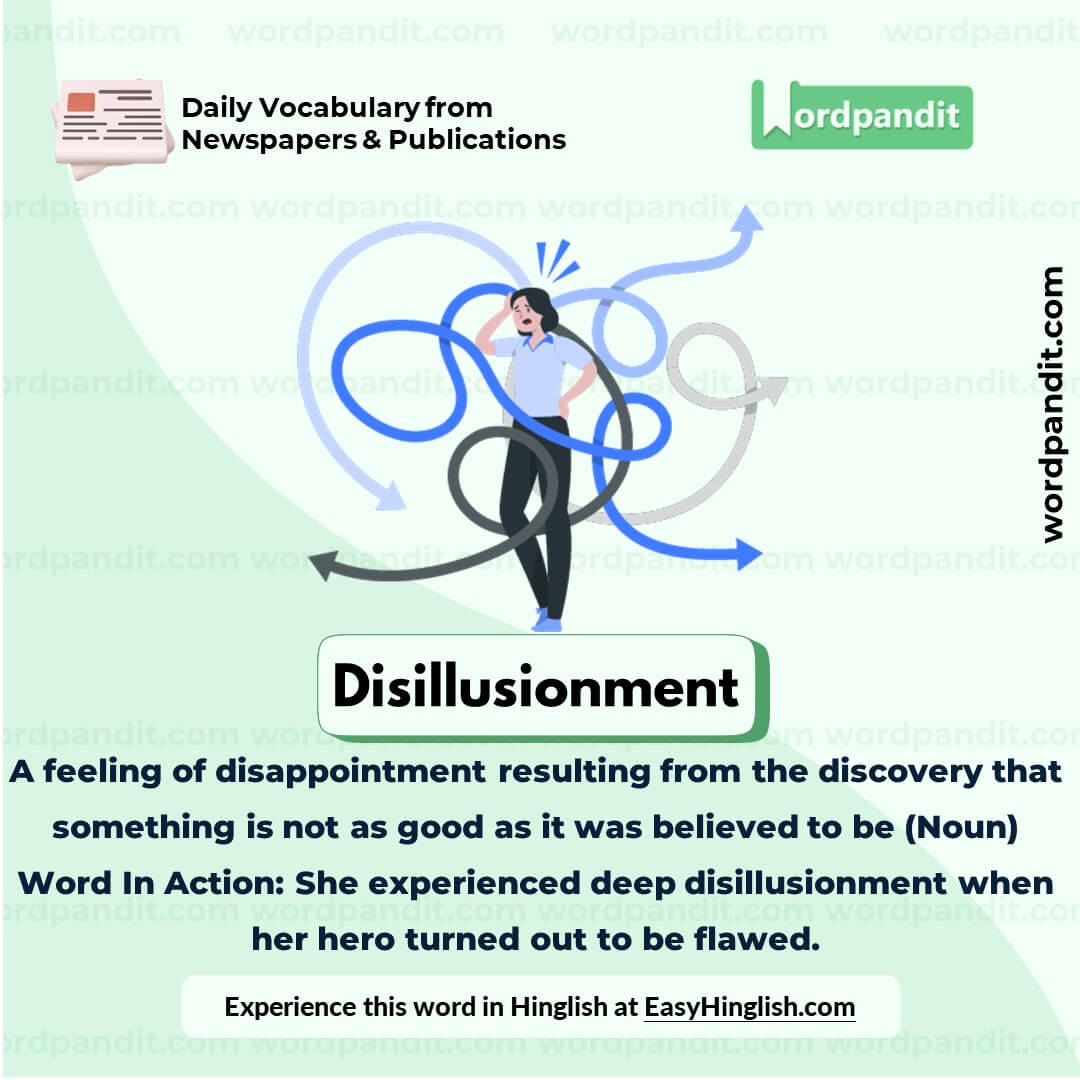Daily Vocabulary from International Newspapers and Publications
Expand Your Vocabulary with Wordpandit’s Global Vocabulary Hub
At Wordpandit, we are committed to helping you develop a truly global vocabulary by drawing from some of the most respected international publications. This section is designed to keep you ahead of the curve by introducing you to words that define global conversations and trends.
The Power of Global Sources
To help you think and communicate on a global scale, we curate vocabulary from renowned international sources, such as:
- The New York Times
- The Washington Post
- BBC
- The Guardian
- The Economist
- Scientific American
- Psychology Today
- And many more...
Stay Global, Stay Competitive
Our daily updates from international publications ensure you are consistently exposed to new words that reflect global news and developments, making sure your vocabulary is not only current but also globally relevant.
Enhance Your Global Perspective
Whether you’re preparing for international exams, aiming to excel in global business communication, or want to enhance your language skills for personal growth, Wordpandit offers the resources you need to thrive in a global context.
Effective Learning, Global Reach
Our learning methodology combines global examples, memory aids, and interactive activities, allowing you to internalize new words effectively and apply them in real-world scenarios.
Begin Your Global Vocabulary Journey Now!
Why Choose Wordpandit?
Practical Learning: Focus on words you'll actually encounter in real-world reading, enhancing your comprehension and communication skills.
Diverse Content: From current affairs to scientific breakthroughs, our varied sources expose you to vocabulary across multiple domains.
Effortless Integration: Make Wordpandit a part of your daily routine. Just a few minutes each day can significantly boost your lexicon over time.
Your Path to Vocabulary Mastery
- Visit our Daily Vocabulary section regularly
- Explore new words and their usage in context
- Practice incorporating these words into your own writing and speech
- Track your progress as your vocabulary expands
Start Your Journey Today
Embark on your vocabulary enhancement journey with Wordpandit. By consistently engaging with our daily posts, you'll build a robust vocabulary that serves you well in academic, professional, and personal contexts.
Remember, a word a day keeps linguistic limitations at bay. Make Wordpandit your daily companion in the quest for vocabulary excellence!
WORD-1: Embittered
Context:
"President-elect Donald J. Trump’s pick to lead the Defense Department was described by peers as a skillful soldier who became embittered by military dysfunction." - New York Times
Explanatory Paragraph:
"Embittered" describes a state of being filled with resentment, bitterness, or anger, often as a result of perceived injustice, disappointment, or failure. It conveys a strong emotional reaction that can influence one’s perspective or behavior negatively.
Meaning: Feeling or showing anger or resentment (Adjective)
Pronunciation: em-BIT-urd
Difficulty Level: ⭐⭐⭐ Intermediate
Etymology: Derived from the Old English word "biter," meaning "bitter," combined with the prefix "em-" to denote a condition or state of bitterness.
Synonyms & Antonyms:
Synonyms: resentful, indignant, acrimonious, sour
Antonyms: content, satisfied, forgiving, serene
Usage Examples:
- After years of being overlooked for promotions, he became embittered and disillusioned with his career.
- The embittered veteran often spoke about the failures of the system he once trusted.
- Her embittered tone revealed the depth of her disappointment in her friends.
- The defeat left the once hopeful team embittered and reluctant to try again.
Cultural Reference:
"Embittered characters often feature prominently in literature, such as Miss Havisham in Charles Dickens' 'Great Expectations,' who harbors lifelong bitterness after being jilted at the altar." - Literary Analysis
Think About It:
Can a person overcome an embittered state of mind, or does bitterness inevitably shape their life permanently?
Quick Activity:
Think of a time when you felt embittered by an event. Write a short paragraph describing how it influenced your actions and whether you moved past it.
Memory Tip:
Associate "embittered" with "bitter" feelings that are "embedded" deeply in someone's heart, creating resentment.
Real-World Application:
The term "embittered" is useful in psychological or social contexts, such as discussing the impact of unmet expectations on workplace dynamics or personal relationships.
WORD-2: Dysfunction
Context:
"President-elect Donald J. Trump’s pick to lead the Defense Department was described by peers as a skillful soldier who became embittered by military dysfunction." - New York Times
Explanatory Paragraph:
"Dysfunction" refers to the failure or impairment of a system, organization, or process to operate effectively. It often highlights issues that prevent smooth operation, whether in social structures, mechanical systems, or biological functions.
Meaning: The abnormal or impaired functioning of a system or process (Noun)
Pronunciation: dis-FUNK-shun
Difficulty Level: ⭐⭐⭐ Intermediate
Etymology: From the Greek "dys-" meaning "bad, difficult, or impaired," combined with "function" from the Latin "functio," meaning "performance or execution."
Synonyms & Antonyms:
Synonyms: breakdown, malfunction, disorder, failure
Antonyms: efficiency, functionality, harmony, operation
Usage Examples:
- The dysfunction within the team led to missed deadlines and miscommunication.
- Organizational dysfunction was cited as the primary cause of the company's decline.
- Family dysfunction can have long-lasting effects on children’s emotional well-being.
- The doctor diagnosed the patient with a dysfunction in their digestive system.
Cultural Reference:
"Dysfunctional families are a recurring theme in movies and literature, such as in the film 'The Royal Tenenbaums,' which humorously explores the complexities of familial discord." - Film Studies Insight
Think About It:
What steps can be taken to identify and address dysfunction in an organization or a system before it escalates?
Quick Activity:
Identify an example of dysfunction in a system you’ve observed (e.g., at school, work, or in a team). Write down three possible solutions to improve its functionality.
Memory Tip:
Remember "dysfunction" as "dys-" (bad) plus "function" (operation), signifying something that operates badly or not as intended.
Real-World Application:
"Dysfunction" is commonly applied in workplace contexts to diagnose and resolve inefficiencies or conflicts in team dynamics and processes.
WORD-3: Atrocities
Context:
"He called the acts of those soldiers, who served in a sister platoon in his company, ‘atrocities’ and added: ‘Of course that’s wrong. No one is here to defend that.’" - New York Times
Explanatory Paragraph:
"Atrocities" refer to extremely cruel or inhumane actions, often involving violence and causing significant harm or suffering. The term is commonly used in the context of war, human rights violations, or other acts of extreme brutality that shock the conscience of humanity.
Meaning: Extremely cruel, violent, or shocking acts (Noun)
Pronunciation: uh-TROSS-ih-teez
Difficulty Level: ⭐⭐⭐⭐ Advanced
Etymology: From the Latin word "atrox," meaning "fierce or cruel," combined with the suffix "-ity" to form a noun signifying an act of great cruelty.
Synonyms & Antonyms:
Synonyms: barbarities, brutalities, horrors, outrages
Antonyms: kindnesses, mercies, benevolences, humanity
Usage Examples:
- The atrocities committed during the war left an indelible mark on the survivors.
- The documentary highlighted atrocities that were hidden from public view for decades.
- Global organizations condemned the atrocities and called for immediate action.
- She wrote a novel inspired by the atrocities her family endured during the conflict.
Cultural Reference:
"The Nuremberg Trials after World War II addressed the atrocities committed by Nazi officials, marking a pivotal moment in the pursuit of international justice." - History of International Law
Think About It:
What role does global awareness and education play in preventing atrocities in the future?
Quick Activity:
Research one historical event associated with atrocities. Write a brief summary of what happened and discuss how the world responded to it.
Memory Tip:
Link "atrocities" with "atrocious acts," visualizing extreme cruelty to remember the meaning.
Real-World Application:
"Atrocities" is frequently used in discussions of international relations, human rights, and history to emphasize the need for accountability and prevention of such acts.
WORD-4: Prosecuting
Context:
"The military prosecuting them was, he said, ‘throwing warriors under the bus.’ The once circumspect officer glossed over crucial details, told his TV audience that troops were just ‘doing the job they were hired to do’ and pushed relentlessly for President Donald J. Trump to intervene." - New York Times
Explanatory Paragraph:
"Prosecuting" refers to the act of bringing legal proceedings against someone, particularly in a court of law, for a crime or offense. It involves presenting evidence and arguments to seek a conviction or establish accountability.
Meaning: To bring a legal case against someone in a court of law (Verb)
Pronunciation: PROSS-eh-kuting
Difficulty Level: ⭐⭐⭐ Intermediate
Etymology: From the Latin word "prosecutus," meaning "pursued," formed from "pro-" (forward) and "sequi" (to follow).
Synonyms & Antonyms:
Synonyms: litigating, charging, indicting, pursuing
Antonyms: defending, exonerating, absolving, acquitting
Usage Examples:
- The state is prosecuting the company for environmental violations.
- The lawyer gained fame for successfully prosecuting high-profile corruption cases.
- Prosecuting war crimes requires extensive evidence and international cooperation.
- The government is prosecuting the individual for tax evasion.
Cultural Reference:
"The concept of prosecuting crimes has been a cornerstone of modern legal systems, as seen in major cases like the Nuremberg Trials, which prosecuted Nazi leaders after World War II." - History of Justice
Think About It:
How does the role of prosecution ensure justice, and what are the risks of misuse of this power?
Quick Activity:
Research a famous case involving prosecution. Write down the main arguments presented by the prosecution and the defense, and reflect on the outcome.
Memory Tip:
Think of "prosecuting" as "pursuing" legal action, as both words share the prefix "pro-" indicating forward motion or action.
Real-World Application:
"Prosecuting" is a key term in legal and judicial contexts, often used in discussions about criminal justice, accountability, and law enforcement practices.
WORD-5: Disillusionment
Context:
"But Mr. Hegseth’s views reflect a disillusionment among a segment of post-9/11 service members, and a slice of the broader public, about how the military is used." - New York Times
Explanatory Paragraph:
"Disillusionment" describes the feeling of disappointment or loss of faith when one realizes that something or someone is not as good, noble, or effective as once believed. It often marks the transition from idealism to a more critical perspective.
Meaning: A feeling of disappointment resulting from the discovery that something is not as good as it was believed to be (Noun)
Pronunciation: dis-il-LOO-zhun-ment
Difficulty Level: ⭐⭐⭐ Intermediate
Etymology: From the prefix "dis-" (expressing negation) and "illusion," originating from the Latin "illudere," meaning "to mock or deceive," combined with the suffix "-ment" to form a noun.
Synonyms & Antonyms:
Synonyms: disenchantment, disappointment, disenfranchisement, letdown
Antonyms: optimism, hopefulness, belief, trust
Usage Examples:
- The disillusionment with political leaders has grown after repeated scandals.
- After years of idealism, she faced disillusionment when her dreams were not realized.
- The artist expressed his disillusionment with the commercial nature of the industry.
- Disillusionment often follows when people place unrealistic expectations on others.
Cultural Reference:
"Disillusionment is a central theme in F. Scott Fitzgerald’s 'The Great Gatsby,' as the characters confront the reality behind their pursuit of the American Dream." - Literary Analysis
Think About It:
How can disillusionment be both a negative and a positive turning point in a person's life?
Quick Activity:
Think of a time when you felt disillusioned. Write a short reflection on what caused it and how it changed your perspective.
Memory Tip:
Link "disillusionment" with "losing an illusion" to remember its meaning of disappointment or loss of belief.
Real-World Application:
The term "disillusionment" is commonly used in discussions of societal change, political shifts, and personal development, marking the moment when ideals meet reality.
















